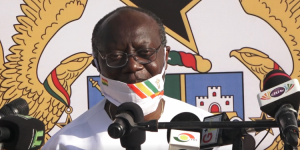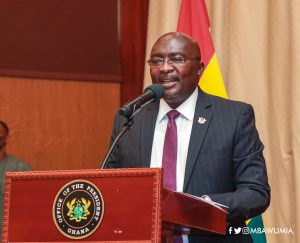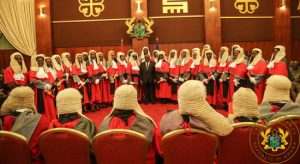The Minority in Parliament has filed a motion asking the Speaker of Parliament to trigger the necessary processes for the House to pass a vote of censure against the Attorney General and Minister of Justice, Godfred Dame.
This follows Godfred Dame’s refusal to facilitate the admission of some 499 students who were denied admission to the Ghana School of Law despite Parliament’s order.
The motion means that the Minority is seeking the removal of the Attorney General from office for supposedly undermining or disrespecting Parliament.
Parliament had directed the General Legal Council, through the Attorney General, to admit the 499 candidates, but the office of the Attorney General and Minister of Justice had said the request is illegal.
It said Parliament cannot direct the GLC on processes for admission into the Ghana School of Law just by a resolution.
“Whilst recognizing the general legislative powers of Parliament in Ghana, except as has been circumscribed by the Constitution, I am constrained to advise that Parliament is devoid of power through the use of Parliamentary resolutions, to control the process of admission into the Ghana School of Law”, a statement from the AG’s office mentioned.
The response from the office from the AG has not sat well with the Minority, who has called on the Speaker of Parliament to take swift action.
“That this Honorable House passes a vote of censure on the Honourable Attorney-General and Minister for Justice, Mr Godfred Yeboah Dame, in respect of the following conduct: Refusal, without justifiable basis, to implement the resolution of this Honorable House unanimously passed on October 29, that the General Legal Council admits into the Ghana School of Law 499 students who sat for and passed the entrance examination of the Ghana School of Law for the 2021/22 legal year In accordance with its own published grounds rules, impugning the image and integrity of this Honorable House through statements unbecoming of the holder of the office of Attorney General and Minister of Justice of this Republic”, a memorandum from the Minority Chief Whip, Muburak Mohammed Muntaka to the Speaker of Parliament, Alban Bagbin had said.
Mr. Dame recently came under public criticism after he emphatically stated that practicing law is a privilege and not a right.
He said this during the induction ceremony of new executives of the Ghana Bar Association (GBA) earlier this week.
“Mr. President and new executives, you owe a duty to drive home the point that the practice of law is not a right, it is a privilege. Along with it comes a moral obligation and a legal duty to uphold the dignity of the profession to ensure that the privileged call to the bar is not abused through unprincipled and disreputable conduct,” he advised.
Constitution on censure of votes against Ministers of state
According to Article 82 of the constitution, a two-thirds majority of Parliament is needed to pass any vote of censure against Ministers of State after the motion has been debated within 14 days upon receipt of the motion by the Speaker of Parliament.
82 (1) Parliament may, by a resolution supported by the votes of not less than two-thirds of all the members of Parliament, pass a vote of censure on a Minister of State.
2) A motion for the resolution referred to in clause (1) of this Article shall not be moved in Parliament unless-
(a) seven days notice has been given of the motion; and
(b) the notice for the motion has been signed by not less than one-third of all the members of Parliament;
(3) The motion shall be debated in
Parliament within fourteen days after the receipt by the Speaker of the notice for the motion
(4) A Minister of State in respect of whom a vote of censure is debated under clause(3) of this article is entitled, during the debate, to be heard in his defence.
(5) Where a vote of censure is passed against a Minister under this article, the President may, unless the Minister resigns his office, revoke his appointment as a Minister.
(6) For the avoidance of doubt, this article applies to a Deputy Minister as it applies to a Minister of state.







